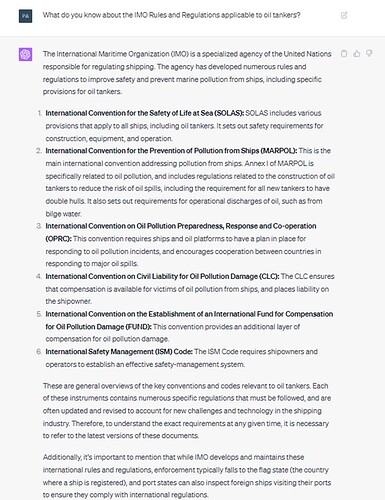Imagine an AI digital tool powered by OpenAI’s cutting-edge GPT-4, a large language model trained by renowned maritime experts. This tool will combine artificial intelligence with human maritime expertise, making it an invaluable resource for stakeholders in the maritime industry such as: universities, seafarers, ship management companies, flag states, governments, agents, legal advisors, banks, etc. Let’s delve into some key points.
We have asked GPT-4 the following questions.
You can refer to the screenshots below for the respective responses.
- What do you know about the Rules and Regulations applicable to oil tankers?
- The ballast water treatment system of a vessel is damaged, and it is approaching a port. What actions should the Master and the management company take from a regulatory perspective? What if the vessel is D-1 and D-2 certified?
- A vessel receives HFO with a flashpoint below 60 degrees Celsius. What actions do you recommend?
- What are the SOLAS requirements concerning lifeboat engine starting methods?
- Is the discharge of untreated sewage from ships permitted?
While GPT-4’s responses may not be entirely accurate and trustworthy, they demonstrate the potential benefits of training GPT-4 with input from maritime experts.
GPT-4, fine-tuned by a group of maritime experts on the International Maritime Organization’s (IMO) Rules and Regulations, could become a reliable virtual assistant dedicated to maritime regulations.
The necessary technology and expertise for this endeavor are readily available.
The maritime industry will benefit a lot if the IMO establishes a dedicated, unbiased, a group of experts that will collaborate on the fine tuning of a large language model like GPT-4 on maritime regulations.
The objective would be to create a publicly accessible virtual expert for Rules and Regulations, benefiting all stakeholders in the maritime industry. However, it is important to note that while this tool has the potential to enhance efficiency and productivity, decision-making should not be solely reliant on machines. Human input will still be necessary.
MARITIME GPT - The Virtual Expert of Maritime Rules and Regulations - Ver.3.pdf (409.7 KB)




